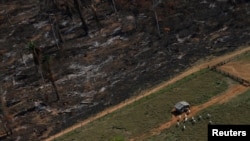Infrastructure projects designed to open the western Amazon for investment are to blame for deforestation in parts of Peru, Colombia and Bolivia — not coca production, researchers said Wednesday.
Policymakers and U.N. anti-drug officials have blamed coca farming for destroying forests in the western Amazon, but a study from Stony Brook University in New York said this was not accurate based on new analysis of satellite maps and other data.
Instead, deforestation was largely caused by new road-building programs and projects launched by South American governments in the 1960s to settle the Amazon frontier, the study published in BioScience journal said.
"We should be stabilizing the [Amazon] frontier rather than fighting against coca production," Liliana Davalos, one of the report's authors, told the Thomson Reuters Foundation. "Deforestation and coca cluster together in the Amazon frontier, but [the deforestation problem] ... sprung from efforts to develop western Amazonia."
Farmers pushing into new areas of the Amazon where legal systems and environmental monitoring are often weak have been a primary driver of deforestation, cutting down trees to grow crops or using the land for livestock grazing, the report said.
Settlers cutting down trees in order to open lands to grow coca, a raw ingredient for cocaine production, had a negligible impact on forests, it said.
Most of the land in the western Amazon belonged to governments when settlement and infrastructure projects were first launched more than 40 years ago, Davalos said.
Today, land ownership in the region is murky and strong data on who owns different pieces of territory is not easily accessible, she said, further complicating efforts to reduce deforestation.
In the past, governments and U.N. officials said poor farmers move into the forest and grow cocaine because they lack better economic alternatives, prompting aid agencies to develop programs to encourage farmers to produce different crops.
The study argued against this model for addressing deforestation in frontier areas with high levels of cocaine production.
Creating formal protected areas was a better way of protecting the rainforest, Davalos said.
Development projects in the region, where there is often an unclear system of land ownership, should work with Amazonian farmers to set clear forest conservation goals, she said.





